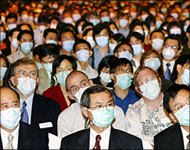SARS crisis compared with Chernobyl
With China’s SARS toll touching 122, the question is whether the illness will trigger more openness in the way it deals with issues of public importance
SARS could be China’s “Chernobyl”, in the sense it could lead to more openness in public dealings, say experts on the Communist country.
Reacting to the Chinese government’s sacking of top officials accused of hiding the severity of the illness, two former US ambassadors to China Winston Lord and J.Stapleton Roy compared the SARS crisis to that faced by the erstwhile Soviet Union 17 years ago at the time of the world’s worst nuclear accident at Chernobyl.
The accident at Chernobyl’s nuclear reactor in led to more political openness in the erstwhile Soviet Union, the two said.
Meanwhile, Asian health ministers met in Malaysia on Saturday to hammer out ways to curb the spread of SARS, while Canada sought to reassure the world it was safe for travel despite a rising death toll.
China, where SARS’ originated has recorded 122 deaths so far from the flu-like virus.
 |
|
Doctors and health care |
The virus, which has no known cure, has killed more than 270 people and infected around 4,800 worldwide after being carried to over 20 countries by air travellers since it emerged in southern China late last year. Asian ministers discussed the introduction of strict pre-travel checks on passengers at airports and seaports in a bid to stop the virus from spreading.
“The threat posed by SARS is unprecedented. Tourism has almost disappeared. Normal life has also been severely disrupted,” Shigeru Omi, head of the World Health Organisation’s Western Pacific regional office, told the meeting.
Efforts this weekend and at next week’s Bangkok meeting of Southeast Asian heads of government would be critical.
“We are at a crossroads. What we decide today and at the heads of state meeting on Tuesday will determine the future course of this outbreak,” he said.
Health chiefs from China and Hong Kong joined others from South Korea, Japan and 10 Southeast Asian states for the meeting near Kuala Lumpur.
Asia has borne the brunt of Severe Acute Respiratory Syndrome (SARS), with most deaths occurring in the region. It has battered Asian economies, forcing governments to cut growth forecasts, and hit business across all sectors from retail to airlines to tourism.
In Canada, the country with most fatalities outside Asia, authorities reported three more deaths in Toronto and eight new cases among health care workers, bringing the death toll to 19.
“We’re not entirely out of the woods on everything, but we’re moving along day by day,” Dr. Jim Young, Ontario’s commissioner of public safety, told a news conference.
Canadian ‘export’
Canadian Prime Minister Jean Chretien, criticised for going on holiday to the Caribbean at the height of the crisis, said the WHO was wrong to warn against non-essential travel to Toronto, the epicentre of SARS in Canada.
WHO justified the warning against Toronto because the country was exporting the virus. The Philippines confirmed on Friday a nursing assistant and her father died of SARS this month after the daughter returned from Toronto.
A respiratory infection with a mortality rate of about six percent, SARS spreads via coughs and sneezes but can also be transmitted by touching contaminated objects. The disease has caused widespread alarm in mainland China with 122 deaths and in Hong Kong, which has reported 115 deaths.
WHO and other groups have accused China of concealing the severity of the outbreak, robbing them of the opportunity to investigate it early and prevent it spreading across China and to other countries. China responded by sacking the health minister and the mayor of Beijing for negligence.
In India, a 40-year-old man tested positive for SARS, authorities said, the country’s fifth case. Some doctors have expressed fears SARS could spread rapidly in India due to its congested cities and overstretched health system. But government officials have played down the risks.
Singapore said on Saturday a 63-ear-old man had died of SARS, bringing its death toll to 18. The city-state also reported its youngest victim yet, an 18-month-old girl.
The city-state has implemented some of the world’s harshest measures to deal with the illness, quarantining nearly 2,800 people and threatening them with fines US$5,600 or six months in jail if they leave their homes.
“Let’s take this thing seriously. If you don’t behave you are imperilling your neighbours, yourself, your country and the economy,” said Lee Kuan Yew, Singapore’s senior minister and founder of the nation’s long-ruling People’s Action Party.
Lee said his wife had been quarantined after being treated in hospital next to a patient who was later diagnosed with SARS and had since died.
Taiwan moved about 480 health workers to a military barracks after their hospital was sealed due to the discovery of SARS, officials said.
The Taipei Municipal Ho Ping Hospital was sealed on Thursday, putting more than 1,100 patients, doctors, nurses and visitors under quarantine after scores had been infected.